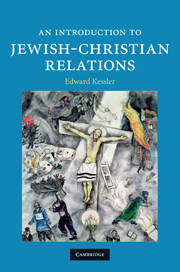Book contents
- Frontmatter
- Contents
- List of illustrations
- Timeline
- Acknowledgements
- List of abbreviations
- 1 Introduction
- 2 The New Testament
- 3 The writings of the church fathers
- 4 The writings of the rabbis
- 5 Biblical interpretation: Another side to the story
- 6 Medieval relations
- 7 Antisemitism and the Holocaust
- 8 Zionism and the state of Israel
- 9 Covenant, mission and dialogue
- 10 Jewish–Christian relations and the wider interfaith encounter
- Further reading
- Glossary
- Index
10 - Jewish–Christian relations and the wider interfaith encounter
Published online by Cambridge University Press: 05 June 2012
- Frontmatter
- Contents
- List of illustrations
- Timeline
- Acknowledgements
- List of abbreviations
- 1 Introduction
- 2 The New Testament
- 3 The writings of the church fathers
- 4 The writings of the rabbis
- 5 Biblical interpretation: Another side to the story
- 6 Medieval relations
- 7 Antisemitism and the Holocaust
- 8 Zionism and the state of Israel
- 9 Covenant, mission and dialogue
- 10 Jewish–Christian relations and the wider interfaith encounter
- Further reading
- Glossary
- Index
Summary
THE ENCOUNTER WITH ISLAM
In one sense, Islam's influence upon Jewish–Christian relations can be dealt with under the familiar theme of supersessionism, since Muslims believe that Islam was the final religion revealed by God through the Prophet Muhammad (c. 570–632). Islam sees itself as perfecting the two monotheistic religions and the Qur'an calls both Jews and Christians Ahl al-Kitab (People of the Book). One consequence of Islamic supersessionism on Jewish–Christian relations is that it provides Christians with an insight into the difficulties raised by traditional Christian supersessionism of Judaism and what is sometimes called replacement theology.
Muhammad's religious practice at first owed much to Arabian Christians and especially Jews: Muslims faced Jerusalem in prayer and fasted during the Day of Atonement.
Surely those who believe, and those who are Jews, and the Christians, and the Sabians, whoever believes in God and the Last day and does good, they shall have their reward from their Lord, and there is no fear for them, nor shall they grieve.
(Q2:62)But after Muhammad failed to gain the support of both other groups, his became a separate religion, claiming to be the fulfilment and reformer of all previous revelations, not just Judaism and Christianity. He expelled two Jewish groups from Medina; finally, a third group was severely treated, the men being killed and the women and children sold into slavery.
- Type
- Chapter
- Information
- An Introduction to Jewish-Christian Relations , pp. 191 - 211Publisher: Cambridge University PressPrint publication year: 2010



